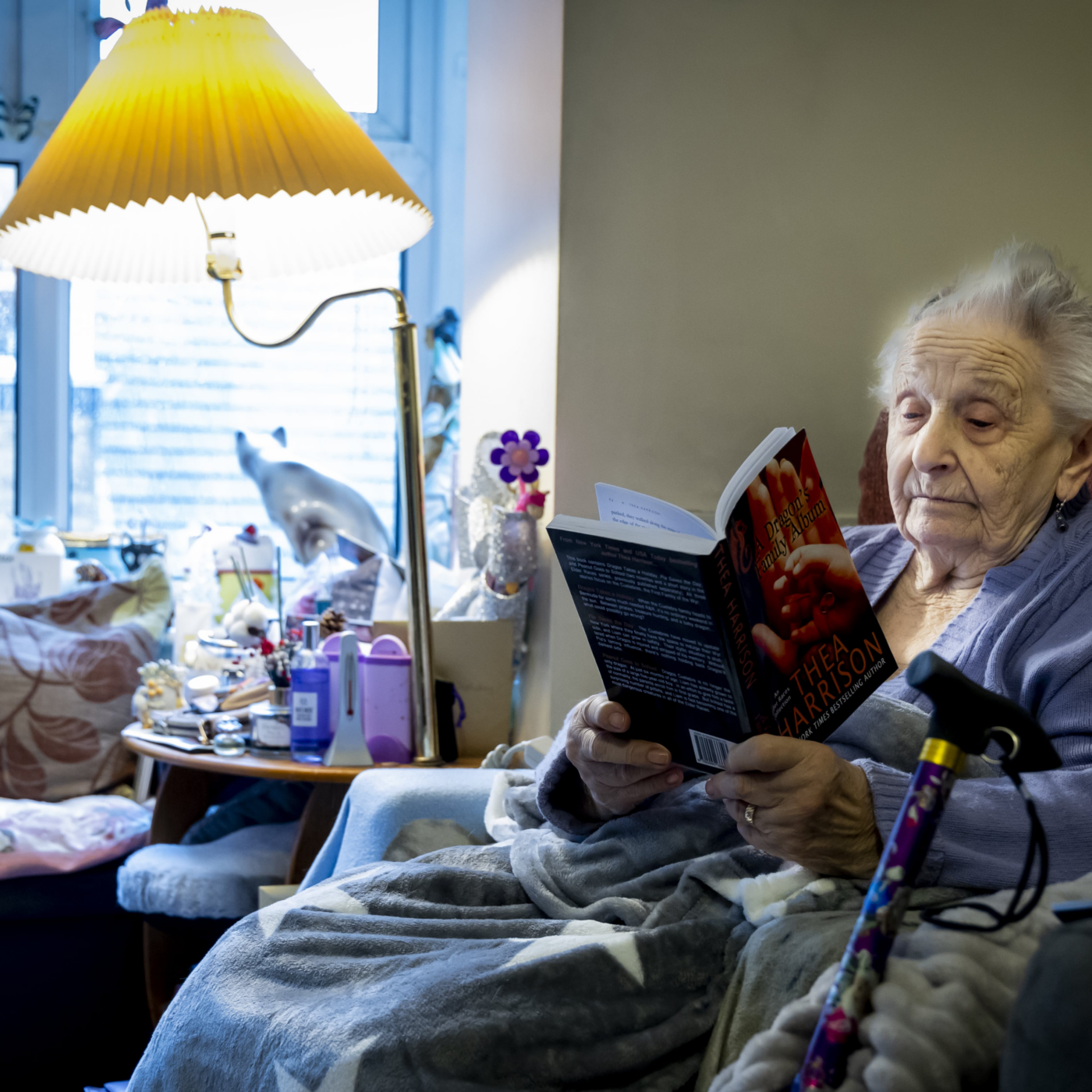Arranging care after a hospital discharge
Tags
Arrange care
When your mum, dad, or anyone you care about is in hospital, certainties can be few and far between. Condition and outlook to even securing a day of discharge can change last minute. If you’re worried about the hospital discharge process and are unsure how to get the right care in place, this article may help.
Often the stresses and strains of having to visit, comfort, and make sure a loved one in the hospital is feeling safe and well can be a full-time activity in its own right. This can be really difficult if it was an emergency admission, or if you live far away.
With all this going on, and when you think you’ve already got the right care solution in your sights, it can be frustrating when a change in circumstance suddenly throws everything off.
If this is the case, there are steps you can take to regain control and make the right care arrangements to support a successful discharge for your loved one, while finding peace of mind for yourself.
Elderly patients are being kept in hospital longer than they need to be
Unfortunately, as of February 2024, it was estimated that 13% of hospital beds were occupied by someone medically fit to leave the hospital. However, they were unable to do so because they’re wasn’t the right provision of care in place to safely support their recovery or ongoing health conditions. These delays in discharge have been fuelled by many large social care providers lacking the number of staff they need to provide care.
Get the latest facts and figures in our home from hospital factsheet here.
Getting their needs assessed
The majority of people can’t wait to get back home after a discharge from hospital. However, if they suddenly find themselves less mobile or steady on their feet, or more breathless or weaker than usual, they’ll likely need someone at home with them to keep them safe. This isn’t always possible if they live alone, or have a partner who has their own limiting health conditions.
Even if they do have family to help them, taking on a caring role is a big responsibility that can be hard to juggle with work or childcare. Unpaid carers may feel ill equipped to take on the vast majority of care tasks too. For example ensuring medication instructions are followed when you can’t be there 24/7 can be incredibly stressful, and providing personal care such as washing or toileting support can be uncomfortable.
What will hospital staff do to prepare a loved one for discharge?
UK hospitals have their own discharge teams, who manage safe transfers of care for those returning home from hospital.
They’ll follow a procedure called ‘discharge to assess’ to review the level of care a person will need once they’ve left the hospital. While the policies around discharge can differ between hospitals, a discharge planner will usually only release a patient if the following discharge process has happened –
- A discharge assessment of their immediate needs has been completed
- If little or no additional care is needed, this’ll be classed as a minimal discharge or simple discharge. Your loved one will be free to return home. they have ongoing eligible care needs their discharge or transfer procedure will be what’s called a complex discharge.
- A senior member of staff has “medically cleared” them.
- A written short-term care plan has been created for those with specific or ongoing health needs. This will usually involve collaboration between the hospital and local community services
- The care plan has been implemented i.e the right level of care has been arranged, either privately, or through your local social services. This also includes making any required home adaptations, such as installing ramps or grab rails.
Understanding Discharge to Assess (D2A)
If your loved one is in hospital and is well enough to leave a ward, but not well enough to return home alone, you may hear the hospital talk about something called Discharge to Assess.
It’s a national framework set up to speed up the safe discharge of patients to places where they can recover peacefully, away from hospital wards. While wards are the best place to be when receiving treatment they’re not always a good environment for relaxing and recuperating. Through Discharge to Assess, patients can leave hospital while continuing to receive support from relevant services, and further assessment into longer-term care options.
A D2A team can be made up of physiotherapists, occupational therapists, social care workers, nurses and GPs, who’ll assess a person’s needs and discharge them through one of four pathways.
- Pathway 0 – no support needed
- Pathway 1 – support provided at home
- Pathway 2 – temporary support in a care home
- Pathway 3 – on-going nursing care in a nursing home
Can you disagree with a hospital discharge?
Yes. If you’re unhappy with your discharge arrangements, or the discharge of someone you know, you have the right to make a complaint.
For example, you can raise concerns if:
- You feel the hospital plans to discharge you before it’s safe.
- You believe your discharge assessment wasn’t done properly. The first step is to talk to the hospital staff who arranged your discharge.
Can I get six weeks of free intermediate or reablement care?
Sometimes a person will only need temporary care after a hospital stay, while they regain their strength and get back on their feet.
In order to aid a timely discharge and allow people to recover in a more comfortable environment the NHS may offer a type of short-term care called intermediate or reablement care. This is a collective term for an effective form of care that can reduce the risk of further admission to hospital, and offer more positive outcomes for people keen to get back to normality.
Intermediate care is usually provided in a person’s own home. However, if a person’s home isn’t suitable or safe for care, they may be offered bed-based intermediate care which will involve a stay in temporary accommodation such as an acute hospital or other community health service. Support will be similar to home-based Intermediate care and should start within a few days of a referral to ensure greater success.
If you’re offered bed-based intermediate care in a facility as the only option, but would prefer to recover at home, you’ll need to make your own private care arrangements in order to be discharged. We’ll cover how to do this later on in this guide.
The type of reablement support a person receives depends on the achievable goals detailed in their individual care plan, and what’s available in their local area. It may be as simple as having regular visits from a carer to support with daily living – helping with personal care, cooking, and cleaning, for example. Meanwhile, other patients may need visits from a mix of clinical staff and social care staff, such as nurses, social workers, and occupational therapists – e.g a speech and language therapist.
NHS intermediate care is NHS funded – meaning it is free for the patient. Most people only end up needing support for a couple of weeks, however, you can receive up to six weeks of reablement care for free.
However, reablement only provides short-term support. Once the six weeks are up if further ongoing care is required this will need to be arranged and paid for either privately, or via a person’s local authority.
If you’re likely to need further support a team should reach out to you during your recovery to review your long-term care needs. This will usually involve a care needs assessment, which will be performed by your local authority. This is also why a thorough discharge assessment is so essential when leaving the hospital, as it ensures longer-term needs are recognised and planned for ahead of time.
Take a look at our guide to what happens during and after free intermediate care services
What is an 'unsafe discharge'?
An elderly person shouldn’t be discharged from hospital until ward staff decide they no longer need to be there. However, with hospitals under pressure and with a limited number of beds, some people have reported instances where they felt their discharge was ‘unsafe’.
Unsafe discharge from hospital refers to a situation where a patient is sent home or to another care setting before it is medically appropriate, or without the necessary support in place to ensure their ongoing care and recovery. This can happen when:
- The patient is still unwell or not fully recovered.
- There is no clear plan for follow-up care after discharge, such as medical appointments or home support.
- The hospital doesn’t offer transport for people to get home, particularly if the discharge happens before 9am or after 6pm.
- The patient or their caregivers do not understand discharge instructions, including medication instructions or warning signs and risk of complications.
- The patient is sent home to unsuitable housing, lacks family support or has no plans in place for their future care.
Unsafe discharges can lead to worsening health, preventable hospital admissions, and serious complications. Hospitals in the UK aim to ensure that discharges are safe by thoroughly assessing the patient’s condition and ensuring adequate follow-up care is arranged.
Arranging the right care after hospital discharge
As we’ve briefly mentioned above there is a lack of community services and residential care at the moment – the demand is simply outweighing the need. However, you’re well within your right to request a preference for private home-based care from a company such as Elder, to help get your loved one a timely transfer home.
Whether temporary or longer term – it’s always worth voicing your preference for at-home care as early as possible. This will ensure additional steps – such as starting a care needs assessment and financial assessment into your eligibility for ongoing care funding can begin.
If your loved one has a life-changing medical condition, they may be entitled to have their full care costs covered via NHS Continuing Healthcare. Speak to the discharge team or ward consultant about beginning the application process.
Home care or residential care?
It can be difficult to know which type of care is best. Often a family’s first thought is a care home, as for a long time this has been the accepted ‘standard’ of elderly care for the vast majority. However, often home care (also called domiciliary care)can provide the same level of care as a care home, without the upheaval. Plus, with an increasing ageing population, many care homes lack the relevant capacity to support the number of older people leaving hospital, especially in winter when illnesses and falls are more prevalent.
As a home care introductory marketplace, we specialise in connecting those needing care to pre-screened self-employed carers. This can be for on-going or temporary live-in care, or for scheduled home visits.
One of the most common issues we deal with is that those working in the hospital are simply unaware that live-in care exists as an option, or are sometimes unaware of how our introductory agency model is treated by the NHS, the CQC, and local authorities.
That’s not to say care homes aren’t a good choice for elderly patients. In fact, some people are better suited to a care home placement. Care home residents can benefit from on-site healthcare professionals, which can support the care of more complex conditions. Outside of the package of care, care homes offer a schedule of social activities and professional catering too.
If you’re unsure which type of care is best we have a quick guide to the most common types of elderly care, to help you make informed choices.
How Elder can help
If your loved one is set on recovering at home but is unable to access free intermediate care services, Elder can help you find a suitable self-employed carer to provide respite care, or home care visits. We can also help you arrange permanent care for longer-term care needs.
1) Give us a call – we may be able to liaise with the hospital discharge planning team or your local social services to check the progress of any care needs assessment, and understand whether a self-employed carer can support your post-discharge needs.
2) If you’re new to the world of care, our care advisors can help you understand more about the different types of funding available. You can also try our free online funding calculator tool to find out whether it’s likely you’re going to be eligible.
3) In some cases, our own clinical team can speak with the medical professionals who are helping your loved one out, to help ensure their needs have been accurately shared with Elder.
Even if live-in care or visiting care via Elder isn’t deemed to be the best solution, that’s ok, we can still speak to the NHS about the different options available and help find the best outcome for your family. In fact, we have trusted partnerships with a number of national nursing care and care home providers – and can put you in direct contact with a provider better suited to your requirements or preferences.
“Our carer took the stress away from my mother while she recovered”.
“I contacted Elder in desperation as my mum was coming home from hospital after a stroke and my father has dementia. I can’t stress how much our carer was invaluable not only to my parents but also to me, as the pressure of taking care of them both on my own was too overwhelming and affected my health too.”Tips for a smoother hospital discharge
Review your hospital care plan and keep it safe
Once you’ve undertaken a care needs assessment, this will keep all your really important information in one place and support your onwards care journey.
Make a list of questions
Think what you’d like to ask the hospital staff, your doctor, or your GP, and write it down in a list. This could be questions about their medical care, advice about medication, or tips on managing their recovery once they leave hospital.
Explore your funding options
Often people are eligible for some level of adult social care funding from their local authority. If you pass the financial assessment and are found eligible you’ll recieve a personal budget. Ask to receive this as a ‘direct payment’ as this will give you greater control over the care provider you can spend it on.
Think about transport
Organise for someone to pick you and your loved one up from the hospital or check if the hospital can organise transport. Some NHS Foundation Trusts provide non-emergency patient transport services to those who would find walking difficult.
Create a contingency plan
If you’ve been providing unpaid care, or would still like to be involved in your loved one’s care it’s important to create a contingency plan. This will help with your emergency preparedness should your loved one be admitted to hospital again. We have a guide on building a contingency plan here.
Ask your doctor or nurse to contact us
We find it’s often much simpler for everyone involved if your relative’s healthcare professional reaches out to us directly.
Voluntary organisations that may be able to offer additional help
While the voluntary sector can’t provide adult carers, they can connect you to helpers who may be able to support with errands, shopping, or provide company while your loved one is recovering at home.
relevant organisations include –
Find your ideal carer
We have connected over 5,ooo families and carers across the UK. Search for yours today.
This article is for informational purposes only and not to be taken as medical advice. For medical advice, always consult your GP.
Sources –
- https://www.healthwatch.co.uk/blog/2023-11-20/nhs-urged-do-more-help-patients-leave-hospital-safely
- https://www.carehome.co.uk/advice/discharge-from-hospital-to-a-care-home
- https://www.nhs.uk/nhs-services/hospitals/going-into-hospital/being-discharged-from-hospital/
- https://www.health.org.uk/publications/long-reads/why-are-delayed-discharges-from-hospital-increasing-seeing-the-bigger
Learn more about arranging care
Take a look at more Elder guides on how to put your care plans into place

What type of background checks should I be doing on a home carer?
What type of background checks should I be doing on a home carer? When you employ a home carer to look after a vulnerable

Elderly nutrition: cooking & meal preparation for the elderly
Elderly nutrition: cooking & meal preparation for the elderly Healthy eating should always be a priority, but as we age, our nutritional needs change

What domestic tasks will a home carer look after?
What domestic tasks will a home carer look after? Live-in carers are at the heart of our comprehensive approach to round-the-clock home care. Care

Home care and self-employed carer insurance
How are home carers insured? Deciding to bring on care at home for a loved one can be an emotional process. Because of this,

How to care for elderly couples and keep them together
How to Care for Elderly Couples When a couple has lived together for many years, they usually want to stay together, however this can

Home help for the elderly
It’s natural to need a little help with things as we age. However, if you or a loved one is finding daily tasks more
